The ultimate guide to Sonos - everything you need to know about this smart sound system
This guide to Sonos will help if you want a smart, multi-room sound system, but are unsure of where to start
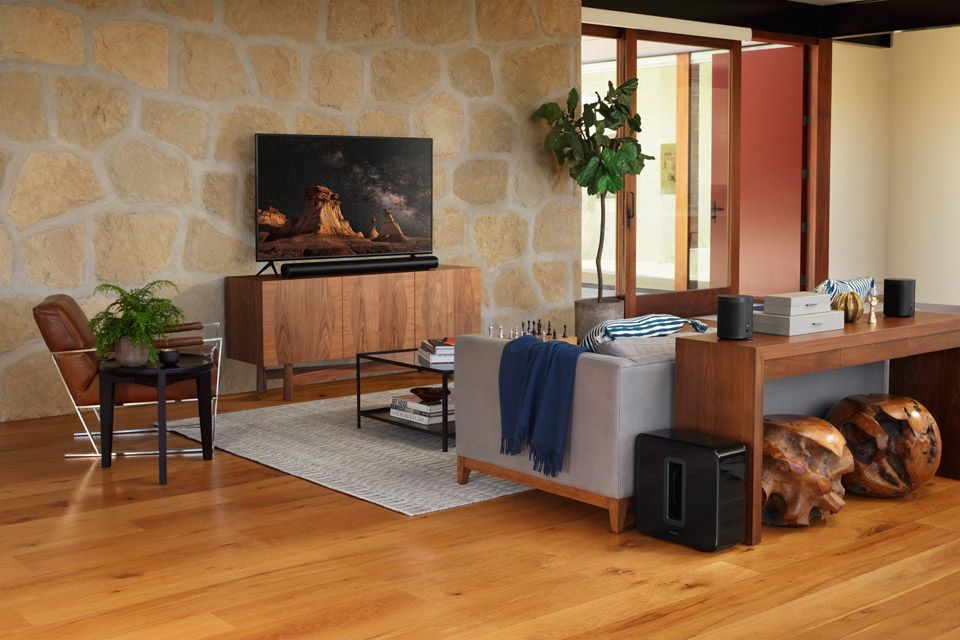

Sonos is one of the leading names in home audio, and for very good reason. Not only is the sound quality excellent, but the company was founded to deliver seamless multi-room audio. Sonos saw that people wanted it, and pioneered an implementation that’s fully featured, easy to set up, and simple to expand as you go along.
But for an outsider examining Sonos’ expanding range of products, it can be difficult to know where to start. It's one of the best smart speakers, but why should you look to the American brand ahead of its rivals? Many now also offer solid multi-room support. Here’s the ultimate guide to Sonos, with everything you need to get your head around before jumping in.
What are Sonos speakers and how do they work?
There was a time when setting up a multi-room audio system required great expense, know-how, and a lot of wiring. Not so with Sonos which in 2005 saw a gap in the market. It introduced its first simple-to-use multi-room speaker, with audio delivered using WiFi.
What does that mean? That your music can be played on multiple speakers, across rooms in your house in perfect beat-for-beat sync without wires. The only limitation (other than the quality of your WiFi, naturally) is the Sonos cap on a maximum of 32 speakers.
While Sonos started off as being devices for locally stored music — think MP3s on a NAS drive — the advent of streaming has been fully supported by Sonos, and it's catching up on the virtual assistant game with both Google Assistant and the best Alexa speakers.
The mention of WiFi above was important: although Sonos has a couple of speakers that support Bluetooth, the products all talk to each other by creating their own WiFi network called SonosNet — a proprietary mesh WiFi system developed by Sonos which ensures the speakers are in sync.
Sonos speakers aren’t just streaming music from your phone or PC — they’re playing it locally, which means no dropouts or interruptions for calls, texts, and notifications. It’s just you and your music, audiobooks, or podcasts, throughout your home.
Sonos speakers, like any other cutting-edge tech, aren’t immune to obsolescence and a number of the company’s products are no longer supported or getting new features. The company does offer a Trade-Up program, where you can upgrade an eligible outdated speaker and get 30% off a new one, however. This once required you to make your old one unusable, but the company backed down on this non-eco-friendly practice following a consumer backlash, and you’re now free to donate, sell or keep using the outdated speaker as you see fit.
What streaming services work with Sonos?
A strong point in Sonos’ favor is its versatility. Sonos speakers support pretty much everything you could wish for in the streaming space: Spotify, Amazon Music, Apple Music, Deezer, Tidal, Soundcloud, YouTube Music, Pandora, Stitcher, TuneIn, SiriusXM, and Audible to name just a handful of the available streaming options.
But that’s just the beginning. Because Sonos was founded in the pre-internet-streaming world of 2002, its original USP was to play locally stored music on a NAS drive or from your iTunes library around the house. That’s still possible if you have a big collection of locally stored music, and with the Sonos Port, AMP, Connect or Connect:AMP, you can even stream your CD or vinyl collection to speakers around your house too.
Which Sonos speaker should I get?
There’s no correct answer to this question, as Sonos makes speakers for different needs and eventualities. The good news is that you don’t need to stick to one variety throughout your house, so feel free to mix and match.
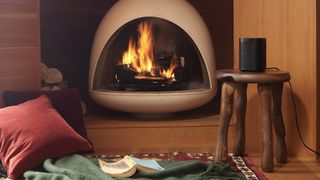
Sonos One / Sonos One SL
The basic Sonos speaker is the Sonos One or Sonos One SL. Both earn their place as some of the best bookshelf speakers that offer excellent sound quality and decent volume for home offices, kitchens, and bedrooms.
The difference between the two? The Sonos One has Amazon’s Alexa and Google Assistant built-in for voice controls, while the SL does not. That makes it a better option for those who feel a bit uncomfortable with having microphones dotted throughout their homes.
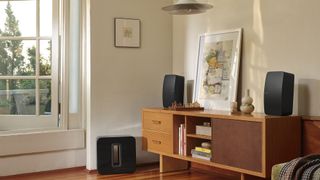
Sonos Five
Sonos’ premium speaker is the Sonos Five, which offers big sound and an attractive if imposing design. Featuring six class-D digital amplifiers, six speaker drivers, three tweeters, and three mid-woofers, it offers complex audio perfect for the living room and larger spaces.
It also has a line-in port for connecting to turntables or CD players if you don’t simply live in the cloud.

Sonos Move / Sonos Roam
Sonos has recently made the move to portability with the Sonos Move and Sonos Roam. These are the company’s first Bluetooth speakers, but while they can be used on the go thanks to their built-in batteries, they also become part of your Sonos WiFi group when at home giving you the best of all worlds.
While the Sonos Move offers big sound and a big price tag, the Sonos Roam is lightweight and relatively cheap. And if you don’t need virtual assistant support built-in, there’s the SL model for less.
Our full Sonos Roam review explains all its good and bad points.
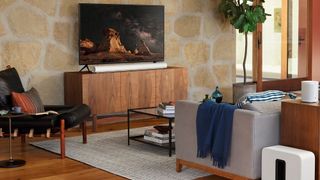
Sonos Arc / Sonos Beam + Sonos Sub
If you want to improve the sound of a TV, but want the soundbar to double up as part of your multi-room audio network, then there are two great options: the Sonos Arc and Sonos Beam.
Both, neatly, let you connect two Sonos One devices as rear speakers if you want the best surround sound system for your movies. Throw in a Sonos Sub and you’ve got a fully-fledged home theater setup.
The Arc is the more premium model, featuring Dolby Atmos support, and comes with a hefty price tag. The second-generation Beam, meanwhile, is more wallet-friendly.
Sonos Ikea Symfonisk
Thanks to the Sonos collaboration with Ikea, Sonos technology is now found in a bunch of attractive home furnishings under the Symfonisk brand name.
These connect to your Sonos network in exactly the same way but are literally built into your furniture so that they can hide in plain sight. Currently, you can buy a shelf, a picture frame, or a desk lamp with built-in Sonos tech.
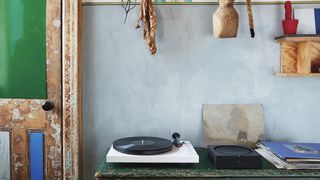
Sonos Amp / Sonos Port
If you have a great set of older speakers but want them to be part of your network, then Sonos has ways of bringing them in with the Port or Amp.
Neither are exactly cheap, with the Sonos Port coming in at $449 and the Sonos Amp setting you back $699. The latter is a far more flexible product, with (as the name suggests) an amplifier built-in, meaning it can connect to passive speakers.
How to set up a new Sonos system
Simply plug in your new speaker, and download the Sonos app for iOS or Android (disappointingly, there’s no option to go through the setup process with a laptop).
Once the app of your choice is installed, tap ‘Set up a new system’ and then create or sign in to a Sonos account. When your speaker pops up on the screen, tap ‘Add’ and the app will ease you through the setup process where you can pick your streaming platforms of choice and enable a voice assistant (if supported by the speaker you picked).
How to add a speaker to your Sonos setup
But, as explained above, the real beauty of a Sonos setup is the ability to connect multiple speakers — up to 32 in total. You don’t have to do all of this at once, and you can gradually add to your setup over time if you wish.
Either way, the process is the same: plug in your speaker and wait for the LED to start flashing green. Then open the Sonos app and from the settings tab, tap ‘System’ and then ‘Add Product’. Follow the instructions and your speaker will be added to the mix.
After you’ve added more than one speaker, you can create custom groups to play perfectly in unison. That’s handy if you want to create a pair of stereo speakers, but is also an option for multiple rooms, if you want your music or audiobook to follow you as you move back and forth between the kitchen and living room, say. Groupings will be remembered until you ungroup them, meaning you won’t have to set it up every time.
What is Sonos Trueplay?
If available, Trueplay is a way of automatically ensuring that your speakers produce the best possible sound for their environment, by adjusting the woofers and tweeters to the shape and acoustics of its location.
It’s something you don’t want to neglect when adding a new Sonos speaker to the mix — If possible, that is. It’s currently only available on the iOS app for most iPhones and iPads, or as a built-in option for the portable Roam and Move speakers. That said, there’s nothing stopping you from borrowing a compatible iPhone as the setup is a one-time thing for each speaker, provided you don’t move it around.
To use Trueplay, open the Sonos app and head to Settings, then ‘Trueplay’ and ‘Trueplay Tuning’. The calibration involves wandering around the room waving your iPhone up and down in smooth movements, which isn’t exactly fun but thankfully isn’t something you need to do often.
Sonos tips and tricks
There are plenty of neat things you can do with your multi-room Sonos setup. Here are a few things you might miss...
Turn off the lights
By default, there are LEDs on your Sonos devices, but this can be annoying if you have a speaker next to your bed. Disable them by opening the app, then hitting Settings > System, finding the group you want to change, and then toggling Status Light off.
Skip tracks with a tap
Sonos speakers have controls built-in, but at a glance, they can look simplistic. However, there’s hidden functionality: skip a track by double-tapping the play/pause button, and for newer touch-controlled models, a swipe left will do the same thing.
Mute a single speaker
Pressing the play/pause button won’t turn off the music for the entire group — just for the speaker, you’re interacting with. That’s handy if you need to take a call in your home office, but don’t want to stop the music for everyone else.
Add parental controls
While Sonos supports plenty of streaming apps, not all the songs available are child friendly. Stop your kids accessing explicit content with parental controls: it’s in the Sonos app, under System > Parental Controls > Filter Explicit Content.
Currently, this only works for Amazon Music, YouTube Music, and Apple Music, but more streaming software will probably follow in time.
Wake up to your favorite song
Sonos speakers can work as alarms if you like: just go to the Sonos app, then System > Alarms > Add Alarm. Then pick a time, room, frequency, volume, and, of course, the song that you want. Just remember that if you’ve grouped together a lot of speakers, all of them will play the alarm at the same time…
Never miss a touchdown
While you may be loath to include the Sonos Beam or Arc soundbars as part of your other groups given their main purpose as TV sound systems, temporarily adding them can offer great benefits. Like if you’re watching the big game and need to get up to make a drink: add the kitchen Sonos device to the group, and you’ll get the commentary even when you can’t see the action in person.
Be a considerate neighbor with Night Sound
Another TV tip, Sonos’ best soundbars all support something called Night Sound, which allows you to boost quiet sounds while reducing louder ones. If you’re the kind of person that likes to watch TV during anti-social hours, but worries about judgment from your neighbors, this is a great way of getting your late-night fix guilt-free.
Be The First To Know
The Livingetc newsletter is your shortcut to the now and the next in home design. Subscribe today to receive a stunning free 200-page book of the best homes from around the world.
Freelance contributor Alan has been writing about tech for over a decade, covering phones, drones and everything in between. Previously Deputy Editor of tech site Alphr, his words are found all over the web and in the occasional magazine too. He often writes for T3 and Tom's Guide. When not weighing up the pros and cons of the latest smartwatch, you'll probably find him tackling his ever-growing games backlog. Or, more likely, playing Spelunky for the millionth time.
-
 I'm a Style Editor and This is My Best-Kept Styling Secret — It's Luxurious, Layerable, and Just $49 on Amazon
I'm a Style Editor and This is My Best-Kept Styling Secret — It's Luxurious, Layerable, and Just $49 on AmazonWhen in doubt, swap in a sheepskin rug. This is the exact one I swear by for winter (or anytime, really)
By Julia Demer Published
-
 Goodbye Muddy Entryway Footprints: The Tangier Boot Tray Has Arrived On My Doorstep — And It's a Step Up in Style
Goodbye Muddy Entryway Footprints: The Tangier Boot Tray Has Arrived On My Doorstep — And It's a Step Up in StyleThis boot tray will ensure your dirty or wet shoes can dry off, your entryway flooring can stay shiny, and your entry closet can stay clean too
By Faiza Saqib Published